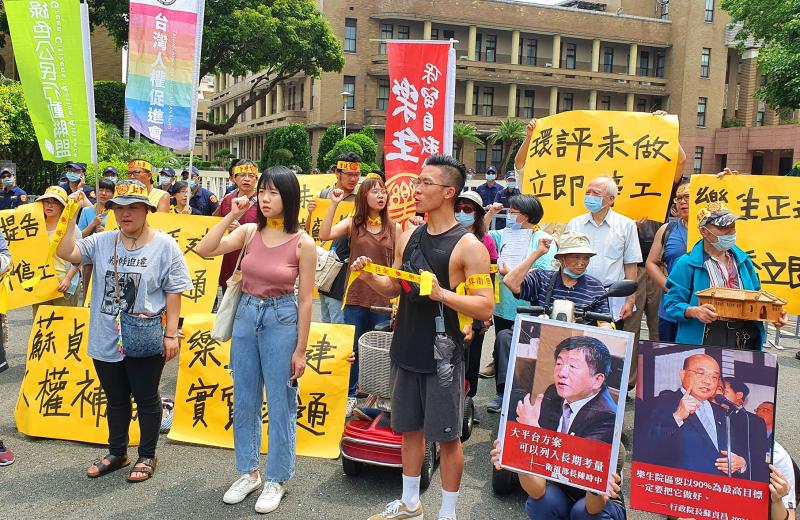Residents of New Taipei City’s Losheng (Happy Life) Sanatorium yesterday protested outside the Executive Yuan in Taipei, demanding that the construction of an overpass near the entrance of the site’s original grounds be halted.
The protest was attended by representatives from several groups, including the Losheng Preservation Self-Help Association, the Youth Alliance for Losheng, the Taiwan Association for Human Rights and the Taiwan branch of the International Association for Integration, Dignity and Economic Advancement — an international organization advocating the rights of people with leprosy.
Completed in 1930, the sanatorium in Sinjhuang District (新莊) was built as an isolation facility for people with Hansen’s disease, also known as leprosy, which was believed to be highly contagious at the time.

Photo: Chang Chia-ming, Taipei Times
The facility was saved from complete demolition thanks to a movement launched by its residents 16 years ago to preserve the original sanatorium, the Youth Alliance for Losheng said.
At the time, about 400 residents took to the streets to protest plans for demolition, it said, adding that about 100 resident remain today.
Following the passage of the Act of Human Rights Protection and Compensation for Hansen’s Disease Patients (漢生病病患人權保障及補償條例) in 2008, the government approved a budget of NT$1.07 billion (US$35.68 million at the current exchange rate) for the reconstruction of the sanatorium, the alliance said.
However, the government did not engage in any real communication with sanatorium residents when planning the project, it said.
It criticized a spiral ramp designed to lead up to the 9m-high overpass.
The ramp, which would twist through 630 degrees, would be inaccessible by sanatorium residents, most of whom have disabilities, it said.
The proposed design would also damage the appearance of the historical site, it added.
The groups accused the authorities of contravening the Environmental Impact Assessment Act (環境影響評估法), saying that construction had begun prior to the completion of an assessment.
Chang Yun-ming (張雲明), deputy chairwoman of the self-help association, said that in addition to the lack of an environmental impact assessment report, construction on the overpass began without the residents’ knowledge.
While there would be an elevator to take people up to the overpass, Chang raised doubts as to whether the residents, most of whom are in their 80s, would be able to operate it.
Tsai Ya-ying (蔡雅瀅), a lawyer affiliated with the Wild at Heart Legal Defense Association, said a group of 13 individuals and organizations on March 31 notified the Environmental Protection Administration (EPA) in writing, saying that the development project has contravened the Environmental Impact Assessment Act.
Under the act, if the competent authority — the EPA — fails to enforce the act within 60 days of receiving a written notification from victims or public interest groups, they may file a lawsuit against it.
Tsai said the group would later yesterday file a lawsuit with the Taipei High Administrative Court.
Development of the Mass Rapid Transit system has also caused the area around the sanatorium, which is on a hillside, to become unstable, she said.
Moving forward with the development plan for the sanatorium without going through proper environmental impact assessment procedures and addressing safety concerns could pose a risk to the residents and other structures in the area, she added.

The manufacture of the remaining 28 M1A2T Abrams tanks Taiwan purchased from the US has recently been completed, and they are expected to be delivered within the next one to two months, a source said yesterday. The Ministry of National Defense is arranging cargo ships to transport the tanks to Taiwan as soon as possible, said the source, who is familiar with the matter. The estimated arrival time ranges from late this month to early next month, the source said. The 28 Abrams tanks make up the third and final batch of a total of 108 tanks, valued at about NT$40.5 billion

Two Taiwanese prosecutors were questioned by Chinese security personnel at their hotel during a trip to China’s Henan Province this month, the Mainland Affairs Council (MAC) said yesterday. The officers had personal information on the prosecutors, including “when they were assigned to their posts, their work locations and job titles,” MAC Deputy Minister and spokesman Liang Wen-chieh (梁文傑) said. On top of asking about their agencies and positions, the officers also questioned the prosecutors about the Cross-Strait Joint Crime-Fighting and Judicial Mutual Assistance Agreement, a pact that serves as the framework for Taiwan-China cooperation on combating crime and providing judicial assistance, Liang

A group from the Taiwanese Designers in Australia association yesterday represented Taiwan at the Midsumma Pride March in Melbourne. The march, held in the St. Kilda suburb, is the city’s largest LGBTQIA+ parade and the flagship event of the annual Midsumma Festival. It attracted more than 45,000 spectators who supported the 400 groups and 10,000 marchers that participated this year, the association said. Taiwanese Designers said they organized a team to march for Taiwan this year, joining politicians, government agencies, professionals and community organizations in showing support for LGBTQIA+ people and diverse communities. As the first country in Asia to legalize same-sex

MOTIVES QUESTIONED The PLA considers Xi’s policies toward Taiwan to be driven by personal considerations rather than military assessment, the Epoch Times reports Chinese President Xi Jinping’s (習近平) latest purge of the Chinese People’s Liberation Army (PLA) leadership might have been prompted by the military’s opposition to plans of invading Taiwan, the Epoch Times said. The Chinese military opposes waging war against Taiwan by a large consensus, putting it at odds with Xi’s vision, the Falun Gong-affiliated daily said in a report on Thursday, citing anonymous sources with insight into the PLA’s inner workings. The opposition is not the opinion of a few generals, but a widely shared view among the PLA cadre, the Epoch Times cited them as saying. “Chinese forces know full well that